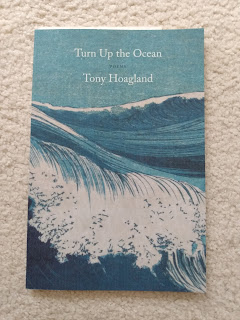Tony Hoagland was one of the highlights of American poetry over the past thirty years, His precision, humor, and deeply human world view make him a must-read in a crowded field. Unfortunately, Hoagland died of cancer in 2018, leaving a very noticeable hole in the panorama of America verse.
What particularly stands out in Hoagland's work is its consistent excellence — from his very first book, Sweet Ruin, until the poems dealing with his imminent demise in Priest Turned Therapist Treats Fear of God, which was published the year of his death. The clarity of vision and mastery of language is there from beginning to end.
At the time, I had assumed Priest Turned Therapist was his last book. However, it turns out Hoagland was working on a manuscript of additional poems, called Turn Up the Ocean, until his death. This compilation was completed by his wife, Kathleen Lee, and recently published by Graywolf Press. Which is good cause for both surprise and excitement.
Any new Tony Hoagland book is an event to be celebrated. His poems are inspirational both in content and their mastery of language and poetics. And
Turn Up the Ocean is no exception.
These are most definitely Tony Hoagland poems. There is the characteristic melding of epic subjects (life, death, etc) with colloquial American idioms. There is the exacting rational structure of thought interspersed with wild leaps of imagination. And, of course, his idiosyncratic and very personable narrative persona.
But as much as I am enjoying the poems in this book, there still seems to be something missing. Not missing necessarily... changed, let's say.
It's not that the poems are unfinished or incomplete as much as they emanate from a different locale than his previous books.
There are three differences I noticed in this book from his previous work:
- No dillydallying. These poems get straight to the point. Hoagland's previous works have a predilection for reveling in the joy of language, playing around a bit before settling in on the actual topic of the poem. The new work gets right to business and pushes ahead, with few diversions.
- Finished, but not complete. In some cases, the poems are not as fully developed as you might expect. What's there is complete, but you get the feeling he loosened up on his usual precision and thoroughness in favor of being done. For example, the poem "'On a Scale of 1-10' Said the Nurse, 'How Would You Rate Your Pain Today?'" which riffs on potential examples of each level of pain, somehow skips from level six to eight. Uncharacteristic for Hoagland. Almost as if he had a stanza for number seven planned, but not ready enough for inclusion.
- Reality does not always allow for certainty. Perhaps the most notable aspect of the latest poems is a diminution of Hoagland's pervasive optimism. It is one of the hallmark's of his poems — no matter how dark they may get, there is a persistent sense of positivity. Even if it is only from learning hard lessons, it is — at its heart — a form of learning and moving forward. However, many of these poems end more with a sigh than with a snap. The certainty is washed out of them and acceptance is more often the conclusion.
The fact is, writing poems while dying must be hard work. And although darker than his previous work, these poems are an essential part of Hoagland's poetic journey and his legacy. And as such, deserve to be treasured.

